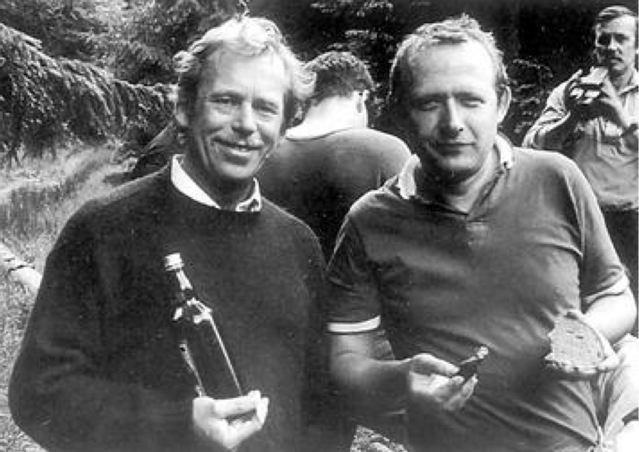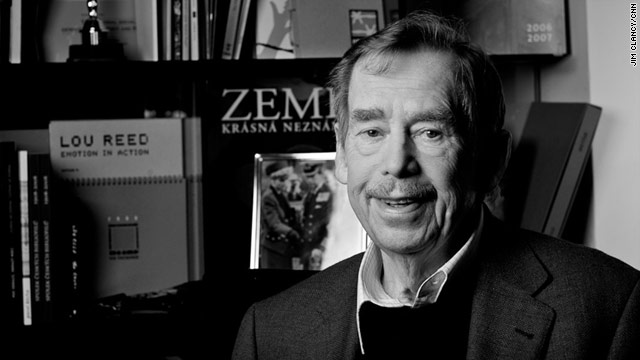Da Havel a Tahrir. Il potere dei senza potere
Paola Caridi - invisiblearabs.com
Ovvero, il potere dei senza potere… ricordando il samiszdat più importante della dissidenza euro-orientale. Vaclav Havel non è stato tanto l’ultimo presidente della Cecoslovacchia, ma una delle più alte espressioni di una opposizione individuale che sfida carcere e omologazione.

Per chi ha amato l’Europa dell’est che diede vita alla rivoluzione del 1989, Vaclav Havel era l’autore del Potere dei senza potere, il samiszdat che segnò una intera generazione di dissidenti. Da Varsavia a Praga, passando per Budapest. Per chi ha amato la grande cultura dell’opposizione politica euro-orientale, Vaclav Havel non è stato tanto l’ultimo presidente della Cecoslovacchia, ma una delle più alte espressioni di una opposizione individuale che sfida carcere e omologazione. Senza grandi clamori, e senza incensarsi.
Per chi ha amato quella storia, c’è una urgenza che ricorre sempre, e ovunque. L’urgenza di difendere i Vaclav Havel, gli Janos Kis e i Gyorgy Konrad, gli Adam Michnik ovunque si trovino. E qualunque età abbiano. Perché la chiave è sempre quella che Havel aveva descritto magnificamente parlando del suo fruttivendolo e di quel gesto scandaloso, da parte di un semplice commerciante di frutta e verdura: staccare dalla parete uno slogan di regime. Ma come? E’ così rivoluzionario togliere uno slogan di regime dalla parete? Certo. Rompe l’omologazione, e così – con questo semplice gesto – rompe il gioco.
The system, through its alienating presence ín people, will punish him for his rebellion. It must do so because the logic of its automatism and self-defense dictate it. The greengrocer has not committed a simple, individual offense, isolated in its own uniqueness, but something incomparably more serious. By breaking the rules of the game, he has disrupted the game as such. He has exposed it as a mere game. He has shattered the world of appearances, the fundamental pillar of the system. He has upset the power structure by tearing apart what holds it together. He has demonstrated that living a lie is living a lie. He has broken through the exalted facade of the system and exposed the real, base foundations of power. He has said that the emperor is naked. And because the emperor is in fact naked, something extremely dangerous has happened: by his action, the greengrocer has addressed the world. He has enabled everyone to peer behind the curtain. He has shown everyone that it is possible to live within the truth. Living within the lie can constitute the system only if it is universal. The principle must embrace and permeate everything. There are no terms whatsoever on which it can co-exist with living within the truth, and therefore everyone who steps out of line denies it in principle and threatens it in its entirety.
Per Havel, vivere nella verità è di per sé il vero atto rivoluzionario (il testo de Il potere dei senza potere si può leggere interamente sul sito di Havel). Lo stesso, identico atto rivoluzionario compiuto anche in questi giorni dagli attivisti di Piazza Tahrir. E’ per questo, per questa insistenza sul valore della verità e dei diritti, che ho sempre pensato a un legame ideale tra la dissidenza euro-orientale e i dissidenti-blogger arabi. Per questo penso alla produzione culturale politica dei blogger come fossero dei samiszdat elettronici. Nuovi strumenti tecnologici, nuova agora virtuale, ma la stessa necessità di una rivoluzione morale prima ancora che politica.
Any existential revolution should provide hope of a moral reconstitution of society, which means a radical renewal of the relationship of human beings to what I have called the “human order,” which no political order can replace. A new experience of being, a renewed rootedness iu the universe, a newly grasped sense of higher responsibility, a newfound inner relationship to other people and to the human community-these factors clearly indicate the direction in which we must go.
Vaclav Havel era un idealista? Alaa Abdel Fattah è un idealista? Non mi è mai piaciuta, questa parola. Sia Havel sia Abdel Fattah non possono fare a meno della verità. Vivere nella verità è ineluttabile, non è idealistico. Ci vuole solo coraggio, e un po’ della pazzia dei jongleur.
Fonte: Invisibearabs.com
19 dicembre 2011






